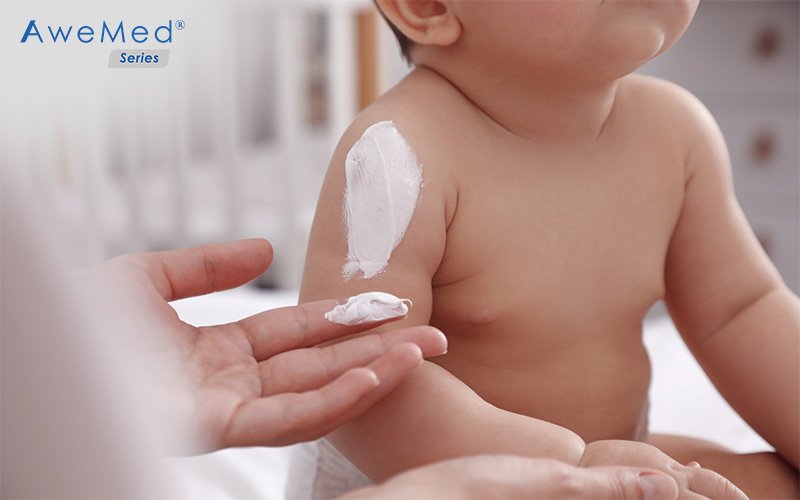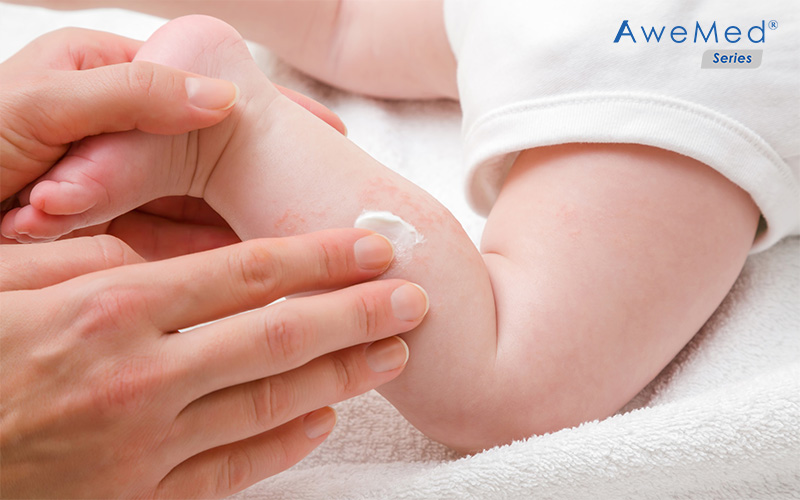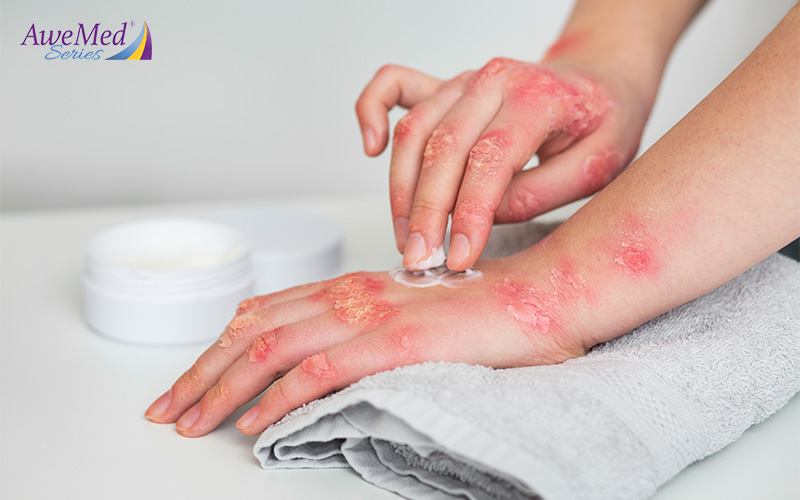Is your baby continuously crying or trying to scratch their skin? These are the potential symptoms of eczema—a skin condition that can cause significant discomfort. This can become stressful for parents because infants are delicate and require gentle treatment. Choosing the right baby eczema cream can help soothe their skin, bringing relief to both you and your little one. This blog provides essential tips for selecting and using eczema creams to keep your little ones happy and healthy.
Things to Look for in Eczema Cream for Babies
Focusing on key ingredients is the first step towards managing your child’s skin condition. Look for a steroid-free moisturizer for itchy skin that contains ceramides. Ceramides, cholesterol, and free fatty acids work well together to strengthen your baby’s skin’s natural barrier, helping it retain moisture and protect against irritants. These lipids are essential for holding cells together and preventing moisture loss, keeping the skin hydrated and healthy.

Licorice is also effective for its anti-inflammatory properties that help address swelling and redness, delivering soothing relief for eczema. It is gentle on sensitive skin, helping to prevent flare-ups without being harsh for your baby. Furthermore, Zinc PCA—an antibacterial agent—helps prevent secondary infections, which are common in eczema-prone skin. This ingredient ensures the baby’s skin remains healthy and irritation-free.
Therefore, considering baby eczema creams with these ingredients to a baby skin care routine can help prevent eczema flare-ups, promoting long-term skin health and protection.
Applying Eczema Cream for Best Results
Just getting the eczema cream is not enough; you need to know how to apply it effectively for optimal results. Apply a thin layer to your baby’s skin after bathing them while their skin is slightly damp. This creates a protective layer while locking in moisture, which is beneficial for managing eczema symptoms.
Gently massage the moisturizer into the affected areas. It is recommended to use the cream at least twice a day, or as needed, to maintain soft and smooth skin. It is best to first consult a paediatrician to understand the right usage of eczema cream for infants and to ensure the best results.
Avoiding Irritants and Common Triggers
Avoiding Irritants in Skincare Products
Babies with eczema have skin that is particularly delicate and prone to irritation, so it’s essential to avoid ingredients that could worsen their condition. Focus on these key areas:
- Choose Hypoallergenic Products: Look for eczema creams that are labelled as hypoallergenic. These products are designed to minimise the risk of skin reactions by using gentler, less irritating ingredients.
- Avoid Harsh Chemicals: Steer clear of products that contain artificial fragrances, parabens, sulphates, and ethanol. These chemicals can aggravate dryness and discomfort, leading to further irritation and flare-ups.
- Opt for Steroid-Free Formulas: Steroid creams may provide temporary relief, but they can also weaken the skin’s natural barrier, making it more vulnerable to irritation. Instead, choose creams or lotions that are free from steroids and focus on gentle, supportive hydration.
Selecting the Right Clothing and Detergents
The fabrics your baby wears and the products used to wash their clothes can significantly affect how their skin reacts. Consider these important points to protect their sensitive skin:
- Soft, Breathable Fabrics: Choose clothing made from soft, breathable materials like cotton. Natural fabrics allow the skin to breathe and reduce the risk of irritation, unlike synthetic materials which may trap moisture and heat.
- Avoid Harsh Detergents: Many laundry detergents and fabric softeners contain chemicals, fragrances, and dyes that can irritate delicate skin. Opt for gentle, fragrance-free detergents that are specifically designed for sensitive skin. These options will help avoid unnecessary exposure to harmful chemicals.
- Wash Baby Clothes Separately: To reduce the risk of irritation, wash your baby’s clothing separately from other laundry. This ensures that their clothes aren’t exposed to any residual chemicals from other garments, such as heavily scented detergents or fabric softeners.
Choosing Gentle Skin Care Solutions
Even with the best attention to products and clothing, selecting the right skincare solution for your baby’s eczema is essential for managing and soothing irritated skin:
- Go for Non-Steroidal Options: Steroid-based creams or ointments can be harsh on the skin over time. Instead, choose creams or lotions that are free from steroids. These will help soothe and hydrate the skin without the risk of long-term damage or thinning of the skin barrier.
- Look for Paraben-Free Formulas: Parabens are commonly used as preservatives in skincare products, but they can contribute to skin irritation, especially for babies with eczema. Choose products that are free from parabens to reduce the potential for allergic reactions or further irritation.
- Select Fragrance-Free and Alcohol-Free Products: Fragrances and alcohols can both dry out the skin and contribute to irritation, so opt for skincare solutions that are free from these ingredients. Moisturisers that are designed to be both fragrance-free and alcohol-free will be much gentler on your baby’s skin and can help maintain hydration while protecting against further discomfort.

Avoiding Irritants and Common Triggers
If you see no improvement in your baby’s skin condition after regular cream application, consult your paediatrician. They can assist in identifying potential triggers and recommend additional treatments if necessary.
Final Thoughts
Finding the right baby eczema cream can significantly improve your baby’s comfort and skin health. Choosing a cream with mild, nourishing components, such as ceramides, licorice and Zinc PCA, will help keep their skin soft, smooth, and hydrated. By applying the cream correctly and steering clear of known irritants, you can keep your baby comfortable and happy.
AweMed Series brings effective solutions for your baby that are free from steroids, ethanol, paraben, and fragrance, ensuring gentle care for delicate skin. Explore our website to learn more about our products and how they can benefit your baby.
References:
Cleveland Clinic, n.d. Eczema. Cleveland Clinic. Available at: https://my.clevelandclinic.org/health/diseases/9998-eczema
Zhang, L., Zhang, Y., Zhang, Z., et al., 2019. Pharmacological effects of curcumin and its application in the treatment of skin diseases. National Center for Biotechnology Information. Available at: https://pmc.ncbi.nlm.nih.gov/articles/PMC7012004/
Frequently Asked Questions
How can I soothe my baby’s skin in addition to using eczema cream?
In addition to using eczema cream, keeping your baby’s skin hydrated and avoiding harsh soaps can significantly soothe irritated skin. You can also opt for lukewarm baths and use fragrance-free products to reduce the risk of flare-ups. For more advice on additional skincare practices, feel free to Contact Us or visit our home page for helpful tips.
How soon can I expect results from using baby eczema creams?
Results can vary depending on the severity of the eczema, but most creams offer relief within a few days to a week of regular use. Consistency is key, as maintaining a proper skincare routine can significantly reduce flare-ups. To learn more about what to expect with eczema treatments, visit our home page for further details.
How can I choose a baby eczema cream that is gentle yet effective for my child’s sensitive skin?
Choosing the right cream is crucial for managing baby eczema, especially for sensitive skin. AweMed® Repair+ is specifically formulated to suit delicate skin, offering gentle yet effective relief. For personalised recommendations based on your baby’s needs, feel free to Contact Us for expert advice.
Can baby eczema creams help prevent flare-ups, and what ingredients should I look for?
While creams can’t completely eliminate eczema, the right ingredients can help minimise flare-ups and maintain skin hydration. AweMed® Repair+ contains key ingredients like ceramides, colloidal oatmeal, and natural oils, which support the skin’s protective barrier.
What are the side effects of baby eczema creams, and how can I avoid them?
Most baby eczema creams are formulated to be safe, but some may cause irritation in sensitive skin. To avoid side effects, choose creams with gentle ingredients like ceramides, colloidal oatmeal, and natural oils, which help protect and hydrate the skin. AweMed® Repair+ is a trusted option, designed to provide effective relief with minimal risk of irritation, ensuring your baby’s skin stays protected.



